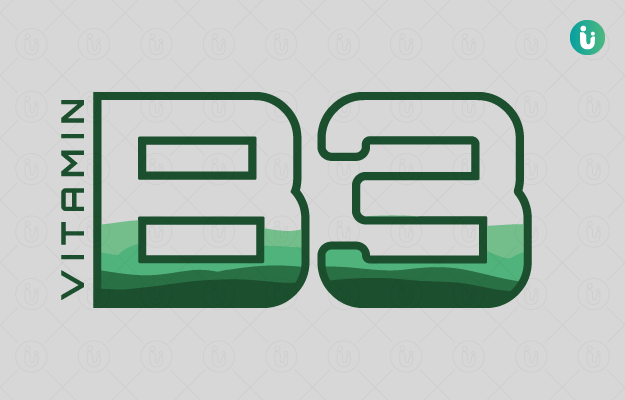What is vitamin B3 deficiency?
Vitamin B3, commonly known as niacin, is one of the B-complex vitamins. It is a water-soluble vitamin, which means it cannot be stored in the body and therefore requires a daily supply from the diet. Since the human body does not produce vitamin B3, it must come from an external source i.e., diet or supplements. It is an essential vitamin responsible for the synthesis of important enzymes which support cell metabolism. Vitamin B3 is important for skin, digestive and mental health.
What are its main signs and symptoms?
- Mild vitamin B3 deficiency presents with minor symptoms, viz. indigestion, vomiting, depression and fatigue.
- Severe deficiency presents in humans as a disease called pellagra which is characterised by the 3 D’s, viz.
- Dermatitis: Itching and inflammation of the skin. It results from sun exposure and DNA damage.
- Dementia: Cognitive and personality changes.
- Diarrhoea: Multiple episodes of severe loose stools
-
According to some studies, vitamin B3 deficiency also increases the risk of cancer.
What are its main causes?
Poor dietary intake leads to niacin deficiency. Deficiency of iron, vitamin B2 and B6 also lead to niacin deficiency. Chronic alcoholism is a leading cause of pellagra. Due to niacin deficiency, the body cannot synthesize the amino acid called tryptophan and leads to corresponding symptoms.
How is it diagnosed and treated?
Diagnosis of vitamin B3 deficiency is straightforward and requires a brief history of the signs and symptoms, such as skin and mouth lesions as well as diarrhoea and dementia. Obtaining a history of social habits like chronic alcoholism facilitates the diagnosis of vitamin B3 deficiency due to malabsorption. Laboratory testing includes a urine test to evaluate the reduction in the levels of N-methylnicotinamide.
Treatment includes a diet of vitamin B3 along with oral supplementation other B-complex vitamins, as multiple deficiencies are common. Vitamin B2 and B6 supplementation is usually preferred along with vitamin B3 for treating the deficiency. The recommended dietary intake for vitamin B3 is 16 mg/day for men and 14 mg/day for women. Fish, meat, grains (other than corn), nuts and legumes are good sources of vitamin B3.

 Doctors for Vitamin B3 Deficiency
Doctors for Vitamin B3 Deficiency  OTC Medicines for Vitamin B3 Deficiency
OTC Medicines for Vitamin B3 Deficiency



















